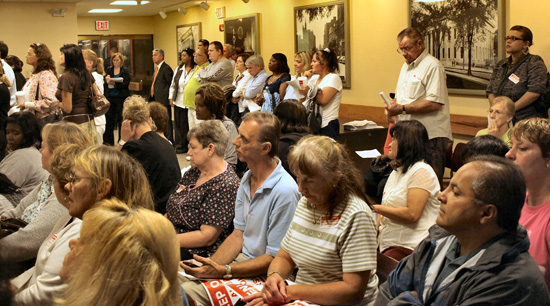NY Capital Region Caregivers Win New Contract
July 12, 2012
1199SEIU members at Albany County Nursing Home (ACNH), a publicly-run skilled nursing facility in New York’s Capital Region, are sighing with relief, for a while at least. At the July meeting of the Albany County Legislature, the 39-member elected body voted overwhelmingly to approve the workers’ contract, the final step in a long process. The agreement was ratified by the membership and signed by the county executive in late May.
“We haven’t had a new contract since 2009 – we’ve been working under uncertain conditions for a long time,” said Donna McBean, a registered nurse at ACNH for more than 20 years. ”After many bargaining sessions, chapter meetings, discussions, meetings with elected officials and public testimonials—we finally have a contract that will provide us with some stability, in uncertain times. For the most part, it simply keeps in place the benefits and protections we already have.”
The nursing home has been slated for either closure or privatization by some for several years. Others have advocated the building of a new facility, but approval from the NYS Department of Health has not been forthcoming. Those ever-changing options, along with the county’s financial woes, have caused much insecurity for the 250 healthcare workers, their residents and all of their families.
The contract is now in effect as of January 1, 2010, for a 4-year term, until December 31, 2013. While there will be no wage increases for the first 3 years, the contract stipulates that a wage re-opener is possible as early as January 2013.
McBean explained that there were some big wins in this contract. “Wage increases were not the major sticking point of these negotiations. Most of us are grateful to have a job and that our residents don’t have to be moved out to another nursing home. In the end, we were able to settle a contract with no give-backs.
“That’s a big deal nowadays,” she said.
The biggest victory came when county management agreed that changing workers’ schedules from the industry standard of every other weekend to one of four days on/two days off was a step in the wrong direction. That plan would have meant that many caregivers would have a Saturday-Sunday weekend off about every six months.
Robina Webb, a longtime CNA said, “We have children. We have grandchildren. We deserve to be able to spend time with them. And, the 4/2 proposal would have done nothing to promote continuity of care. Frankly, we think workers would leave the nursing home under those circumstances, and that wouldn’t have been good for anyone. I’m glad the county understands that now.”
In addition to keeping their schedules, workers also pushed back management proposals that would have changed overtime policies, increased health insurance premiums and co-pays for some members and modified the steps of the current disciplinary process.
The next critical issue before the county legislature concerns the approval of $700,000 in federally mandated sprinkler improvements, which must be finished by next August or the nursing home is at risk of losing federal funds.
Members of the two bargaining units at ACNH, the RNs and service and maintenance employees, work closely in matters of both healthcare delivery and union issues. The service and maintenance unit includes LPNs, CNAs, dietary, housekeeping, laundry and maintenance workers.




